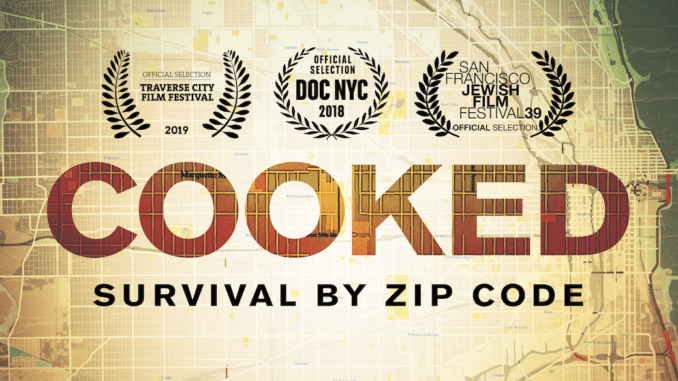
In April 2020, the Chicago Headline Club held discussion about covering our most vulnerable communities in crisis, as we talked about the COVID-19 pandemic and the documentary COOKED: Survival By Zip Code about the 1995 heatwave that killed 739 mostly black, elderly and poor Chicagoans.
This was a special event with a focus on journalism’s role in informing policy and framing critical conversations, and was open to the public.
Watch the video conference here:
About the documentary:
In COOKED: Survival By Zip Code, Peabody Award-winning filmmaker Judith Helfand uses her signature serious-yet-quirky connect-the-dots style to take audiences from the deadly 1995 Chicago heat wave — in which 739 mostly black, elderly, and poor Chicagoans died during the course of one week– deep into one of our nation’s biggest growth industries: disaster preparedness. Along the way, she forges inextricable links between extreme weather, extreme disparity, and extreme racism, daring to ask: what if a zip code was just a routing number and not a life-or-death sentence? Adapted from Eric Klinenberg’s ground-breaking book HEAT WAVE: A Social Autopsy of Disaster in Chicago, COOKED reframes the narrative from a story about a devastating heat disaster to one about the long-term impact of systemic inequality and racism meets climate change. And now, during the coronavirus pandemic, a new public health crisis, COOKED has become more relevant than ever. In the film, Dr. Steve Whitman, founder of the Sinai Urban Health Institute, refers to Chicago’s heat-death poverty map overlaid with a current map of underlying public health crises, saying, “It’s all the same map. Heat deaths, breast cancer, heart disease, diabetes …..” If he were alive today, Dr. Whitman would add COVID-19 deaths to the list for those same South and West Side neighborhoods
You can watch a 56-minute version of the documentary for free on PBS.
Members of Amazon Prime can watch the full, 1 hour 21-minute version here.
Our panelists included:
Judith Helfand, director and producer of Cooked: Survival by Zip Code. Helfand is best known for her ability to use her quirky sense of humor, irony, personal storytelling chops and the power of transparency to tackle some of the most pressing issues of our time — from toxic chemical exposure to climate change to the “politics of disaster.” Three of her films have premiered at Sundance and been nationally broadcast on PBS (POV, Independent Lens), HBO and The Sundance Channel.
Maudlyne Ihejirika, an award winning, Chicago Sun-Times Urban Affairs Columnist/Reporter with 30 years experience in journalism, public relations and government, who was recently named among the Power 25, an annual ranking of the 25 most powerful women in Chicago journalism. She holds a B.A. in Journalism from the University of Iowa and an M.S.J. from Northwestern University’s Medill School of Journalism. She currently pens the Sun-Times “Chicago Chronicles,” long-form columns on “people and places that make Chicago tick,” and is the author of Escape From Nigeria: A Memoir of Faith, Love and War, a riveting tale of her family’s survival of the brutal Nigerian-Biafran War, and miracles that brought them to the U.S.
Andy Nebel, is former journalist who covered the 1995 heatwave. Nebel is a producer and director in Chicago, originally from Far Rockaway, New York. With over 35 years of media experience Andy has traveled the world to relate impact filled stories through video, radio, and the web. Andy spent 13-years as an on–air reporter and TV producer. His final stop in television news was at WLS-TV (ABC ) in Chicago where he covered features and breaking news from 1995-1997. He opened The Andy Nebel Company in 2007 which specializes in corporate video.
Robert K. Elder is the moderator of this panel. He’s the 2019-2020 president of the Chicago Headline Club and the Chief Digital Officer for the Bulletin of the Atomic Scientists.
Watch the trailer here:

